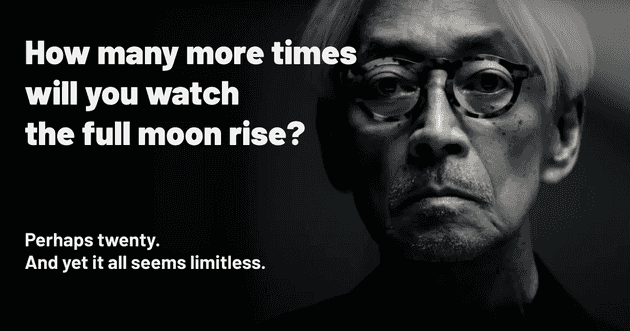Death is always on the way,
but the fact that you don't know when it will arrive
seems to take away from the finiteness of life.
It's that terrible precision that we hate so much.
But because we don't know,
we get to think of life as an inexhaustible well.
Yet everything happens a certain number of times, and a very small number, really.
How many more times will you remember
a certain afternoon of your childhood,
some afternoon that's so deeply a part of your being
that you can't even conceive of your life without it?
Perhaps four or five times more.
Perhaps not even.
How many more times will you watch the full moon rise?
Perhaps twenty.
And yet it all seems limitless.
― Paul Bowles, The Sheltering Sky
Legendary composer, producer, and artist Ryuichi Sakamoto took his final bow at 4:33 AM on March 28, 2023, at the age of 71.
He had been aware of the limited time he had left since December 2020, when his doctor told him, "If nothing is done, you only have half a year to live."
After battling with rectal cancer for another three years, Sakamoto entered palliative care on March 25, 2023.
Yet just two days before his death, on March 26, he was still remotely discussing his exhibition, SOUND AND TIME, with Shiro Takatani.
Between March 21 and 26, Sakamoto watched every performance of "Tohoku Youth Orchestra" from his hospital bed while on an IV drip and provided guidance through messaging apps as their musical director.
From March 14 to 16, Sakamoto recorded about 20 minutes of music. These are his final recordings.
Work until his final breath
Maybe Sakamoto didn't use his last energy to sustain his own life but spent it on work 1 because he was unaware of how soon his life would end.
However, perhaps channeling his remaining energy to art and music is precisely how he was sustaining his own life. It brings to mind Walt Disney's final days. Despite being on his deathbed and only able to stare at the hospital ceiling, Walt Disney was still going over the plans for Disneyland with his partner. He dedicated his last moments to the magical joy he believed it would bring.
It must be fulfilling to find such passion, something they love so much that they decide to work on until they die. They dedicate their final breath to what fuels the purpose of their life. And to me, it's a life well-lived.
210 years
One family member said, "Sakamoto's life was equivalent to three average people's." His 71 years felt like 210, a life so full that his journey seems not to be a single timeline, but composed of several parallel paths he walked simultaneously.
If we live a fulfilled life, 71 years can be more than enough. But to have a fulfilled life, we must find the work we love.2
Final performance
After receiving his terminal diagnosis, Sakamoto immediately conducted the filming with Tin Drum on the project called KAGAMI, which translates to "mirror" in Japanese. This Mixed Reality project invites audiences to witness a virtual Sakamoto in 3D performing on piano alongside dimensional art.
Mixed reality filming was exhausting, especially right after knowing his days were numbered. After the filming ended, Sakamoto felt drained for about a month. But he reflected, "Maybe it's precisely because of this work that I was able to get through my state of affliction. And being able to leave a performance record that I could accept before dying is a relief."
Ars Longa, Vita Brevis
There is, in reality, a virtual me.
This virtual me will not age, and will continue to play the piano for years, decades, centuries.
Will there be humans then?
Will the squids that will conquer the earth after humanity listen to me?
What will pianos be to them?
What about music?
Will there be empathy there?
Empathy that spans hundreds of thousands of years.
Ah, but the batteries won’t last that long.
For the project KAGAMI, Sakamoto jotted down these lines, perfectly resonating with his favorite Latin motto during his lifetime:
Ars longa, vita brevis.
(Art is long, life is short.)
For more about Sakamoto's reflection on life, music-making, and social activism of his final decade, read his memoir "How many more times will I see the full moon" (我還能再看到幾次滿月? / ぼくはあと何回、満月を見るだろう).3
I also wrote a follow-up article to extract some intriguing pieces from the book. Check out Inside the Mind of the Legendary Composer Ryuichi Sakamoto.
Recommend reading it with Out Of Noise, my favorite album of his.
-
^
This reminds me of Brian Chesky, who used to ask early hires at Airbnb if they would work at Airbnb if they only had one year left to live. He changed it to ten years because people who say yes for one year probably just don't like their families. See Culture with Brian Chesky and Alfred Lin (How to Start a Startup 2014: Lecture 10).
-
^
Though Sakamoto rarely talked about his family in public, I believe we must also find the people we love.
-
^
As of the time of this writing, there's no English translation available yet unfortunately.

